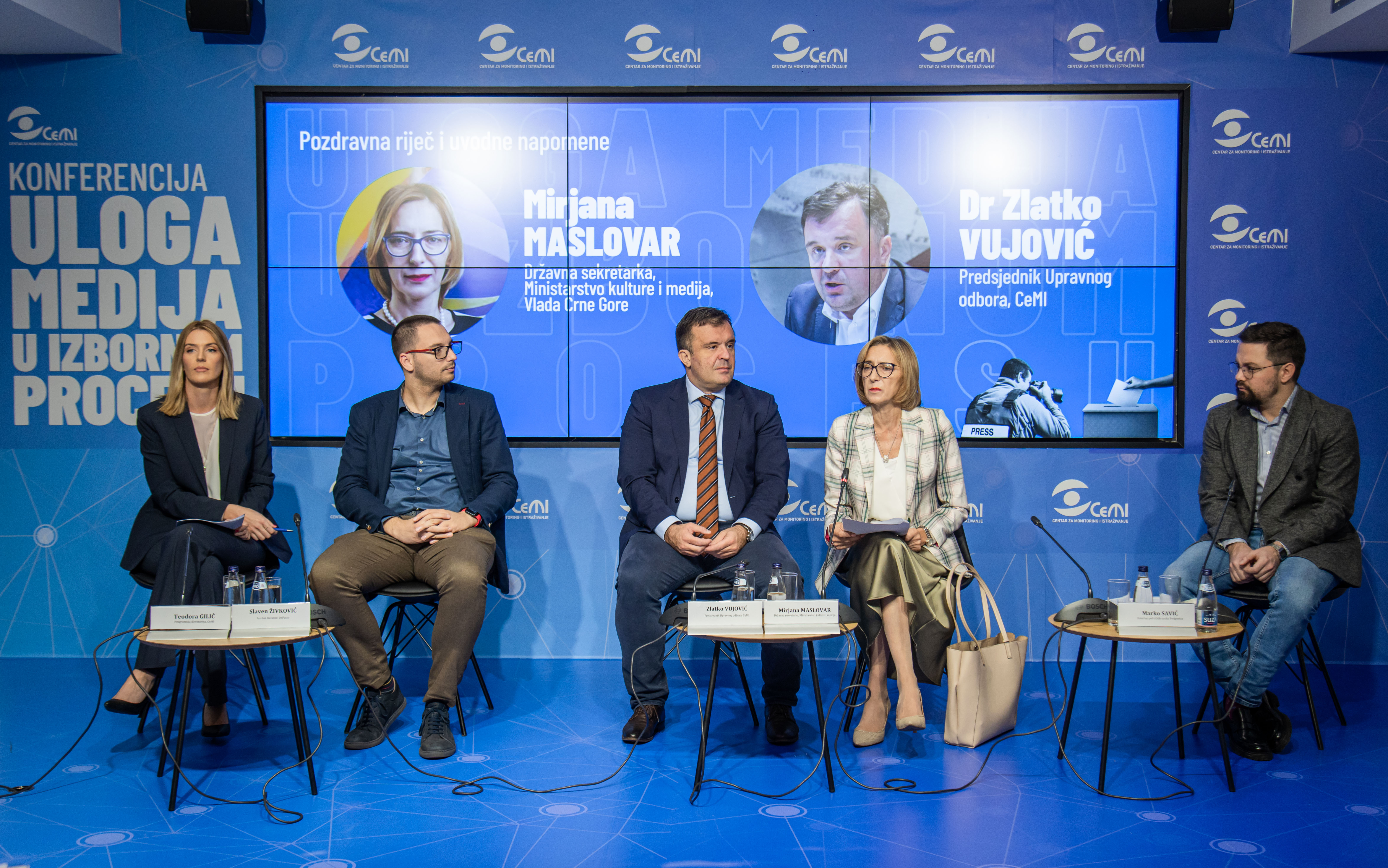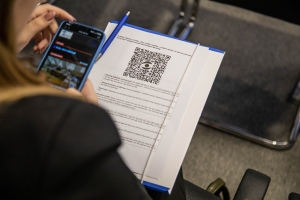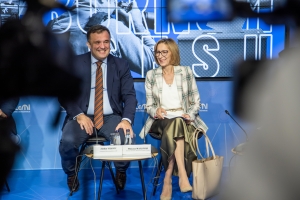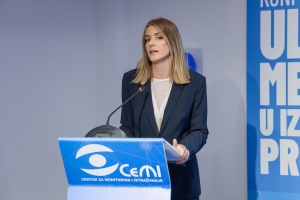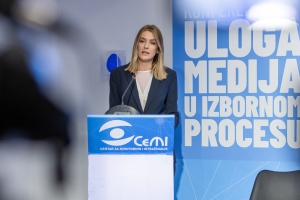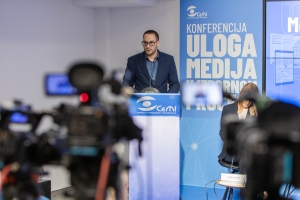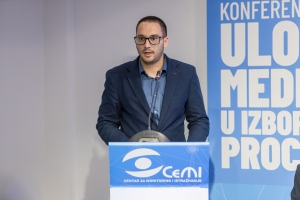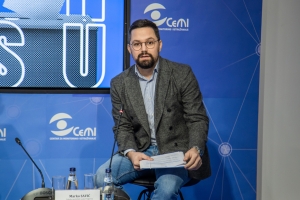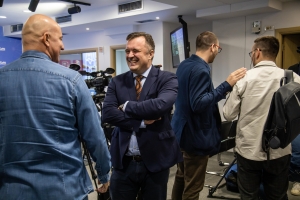Polarized media in Montenegro means that there is almost no party that is seen similarly by citizens who read different media, which is why they should turn to information that unites them, and not those that distance and deepen divisions.
This was announced at the conference "The Role of the Media in the electoral process in Montenegro", which was organized by the Center for Monitoring and Research (CeMI).
The President of the Governing Board of CeMI, Zlatko Vujović, said that in a divided society, such as the Montenegrin one, the media are also divided.
"In a polarized society, each of the media, no matter how much they try or don't try, somehow falls into one of two sides - the position and the opposition. Although during this research we also have those media that managed to stick to the political center", said Vujović.
He pointed out that the danger of a polarized society is the influence of external actors, which, he said, we are witnessing in Montenegro as well.
"There are some concerning indicators, and we are also facing the problem of capital concentration in media companies by entities from outside of Montenegro. There are no institutional mechanisms as seen in numerous European Union countries where it's not possible for non-community actors to have dominant control over the media," Vujović stated.
He believes that Montenegro still lags behind in creating a conducive environment for the development of media freedom and objective reporting.
"CeMI's research findings showed that the dominant percentage of Montenegrin citizens who were surveyed, almost 90 percent of them, believe that there are no completely impartial media in Montenegro. These are not encouraging statistics, but they should encourage us all to contribute to creating an environment where the media will help overcome polarization, making it shallower, and turn to data that unites us instead of those that drive us apart," Vujović said.
The State Secretary at the Ministry of Culture and Media, Mirjana Maslovar, emphasized that the primary goal of the Media Strategy, recently adopted by the government, is to introduce order into Montenegro's media landscape, which has been particularly contaminated in recent years by the role of social media and unregistered portals. She pointed out that the fight against disinformation has become a battle for the survival of professional journalism.
"By adopting and implementing this strategy, we need to address challenges in developing media pluralism and face constant threats of media polarization, insufficient self-regulation, intolerable ease of interpretation, and the deep-rooted practice of political instrumentalization," stated Maslovar.
He believes that media literacy, as a phrase, is mainly addressed to the audience - readers, listeners, and media consumers.
"However, media literacy and journalistic expertise is something that must be established as an unquestionable standard within the media community of Montenegro, and that's why understanding the essence of media literacy is the most important for journalists and media editors," Malovar said.
She emphasized that the role of the Ministry of Culture and Media is to make the Media Strategy a lever for the development of democratic processes in Montenegro.
"Our task is to elevate media literacy to the level of a critical and responsible attitude toward reality and its interpretation, to protect media workers from any attempt to undermine their freedom and consistency in the pursuit of truth, objective and timely information, reflection, opinion, and stance. There can be no democratic and reform-oriented Montenegro without media that lead the way and pave the path for best practices," Maslovar emphasized.
Presenting the findings of the study "The Power of Media and Politics: Analysis of Influence on Electoral Processes in Montenegro," Teodora Gilić, the Program Director of CeMI, stated that during the research, they analyzed the habits of citizens, divided them into two groups—opposition voters and voters of the parliamentary majority—and examined which media outlets they choose as their primary source of information.
"Voters of the parliamentary majority predominantly chose media outlets close to the politics of the parliamentary majority. On the other hand, opposition voters read both types of media almost equally. The data show a significant imbalance in citizens' habits; however, it is essential to consider that the category of media close to the parliamentary majority includes outlets such as Vijesti and RTCG, which have dominated our media scene for years. Therefore, citizens have developed a habit of following these media, and at the same time, these are the outlets in which both opposition voters and voters of the parliamentary majority have a high level of trust," Gilić explained.
According to her, the research showed that voters of the parliamentary majority have the most confidence in Vijesti compared to other media (62.6% of them), while opposition voters have the most confidence in RTCG (57.5% of them).
"What certainly confirms polarization is that the trust of opposition voters in media outlets predominantly close to the parliamentary majority is quite low, ranging from 8.8% in the case of Borba.me to around 17% when it comes to PINK M. The same situation is present among voters of the parliamentary majority, with the lowest confidence in CDM, TV E, and Pobjeda, i.e., in media predominantly close to the opposition," Gilić said.
Presenting data related to the tone of media coverage, Gilić said that the majority of positive media coverage was directed towards the "Zajedno" coalition (596), followed by the " Pokret Evropa Sad" (367), the "Hrabro se broji" coalition (344), the "Za budućnost Crne Gore" coalition (297), and the SDP (310) with positive media coverage.
"In terms of negative media coverage, most of it was directed towards the 'Pokret Evropa Sad' (361) and the 'Zajedno' koaliciji (324). Following them, we have the 'Hrabro se broji' coalition with 257 negative media coverage and the 'Za budućnost Crne Gore' coalition with 147 negative media coverage," Gilić said.
She pointed out that the biggest imbalance between negative and positive coverage was noticed in relation to the SDP, which has many more positive than negative media coverage, as well as in the "Za tebe" coalition - SNP and Demos.
She emphasized that the polarization observed in the media landscape is also present on social media.
Executive Director of DeFacto Consultancy, Slaven Živković, stated that within the research, they have cross-referenced data related to the media that citizens follow with data on who they voted for in the second round of the presidential elections.
"The research showed that Jakov Milatović's voters predominantly watch TV Vijesti, read Vijesti portal, Pink, Prva, and Dan. On the other hand, Milo Đukanović's voters predominantly read CDM, Pobjeda, Gradski portal, watch Gradski TV, and listen to Antena M, and TV E," Živković noted.
He pointed out that polarized media make citizens, even if they live in the same country, city, and street, sometimes live in entirely different realities because they can have completely different information by following a different group of media.
"The research showed that almost 90 percent of citizens in Montenegro completely or partially agree that the media in Montenegro are biased and report in line with a certain ideology and political party," Živković noted.
He explained that respondents were asked to what extent they trust significant media in Montenegro.
"With the help of factor analysis, we were able to divide all media into several groups depending on how people are grouped together. The statistical program identified two groups, one of which supports the opposition, and the other the parliamentary majority. The supporters of the parliamentary majority include Vijesti, Prva, Pink M, Adria, Radio Television Nikšić, IN4S, and Borba," Živković said.
He explained that the second group of media consists of Gradska Televizija, Nova M, Televizija E, CDM, Antena M, and Pobjeda.
"The data we have obtained show that people who are more inclined to trust Televizija E or Gradska Televizija are less likely to trust portals like IN4S, Borba...," Živković said.
He explained that in this division,Television of Montenegro doesn’t fall into any group.
"Sentiment thermometers show a significant polarization in Montenegro. Voters of presidential candidates Milo Đukanović and Jakov Milatović were asked to what extent they like or dislike the candidates. Voters of Milo Đukanović are very favorable towards that candidate. However, they are quite critical of Jakov Milatović," Živković noted.
He mentioned that the same data applies to Jakov Milatović's voters, who rate that candidate quite highly but have an extremely low opinion of Milo Đukanović.
"We asked citizens who voted for Jakov Milatović whether they voted for him or against Milo Đukanović, and we obtained interesting data. Within his group of supporters, 60% said they voted for Jakov Milatović, while 40% voted against Milo Đukanović," Živković stated.
He also said that they asked citizens how warmly or coldly they feel towards political parties, noting that for the DPS, the average rating is around 30, with a stable number of people who support this party.
"The increase in the number of high ratings may indicate that the DPS is strengthening its base of loyal supporters. However, the downward trend in the overall average rating suggests that the party may be losing moderate voters or those who were previously mildly inclined. On the other hand, PES receives a stable high average rating on the sentiment thermometer but does not record an increase in the number of those who give this party a particularly high rating. A consistently high average rating may suggest that the party has broad support among voters. However, the fact that the number of those giving it an extremely high rating is not increasing may suggest that it still lacks a strong core of loyal supporters who are deeply attached to the party, its program, or leadership."
He pointed out that the research showed that among opposition parties, DPS is in the best position, while among pro-government media and RTCG, Evropa Sad has the best standing.
